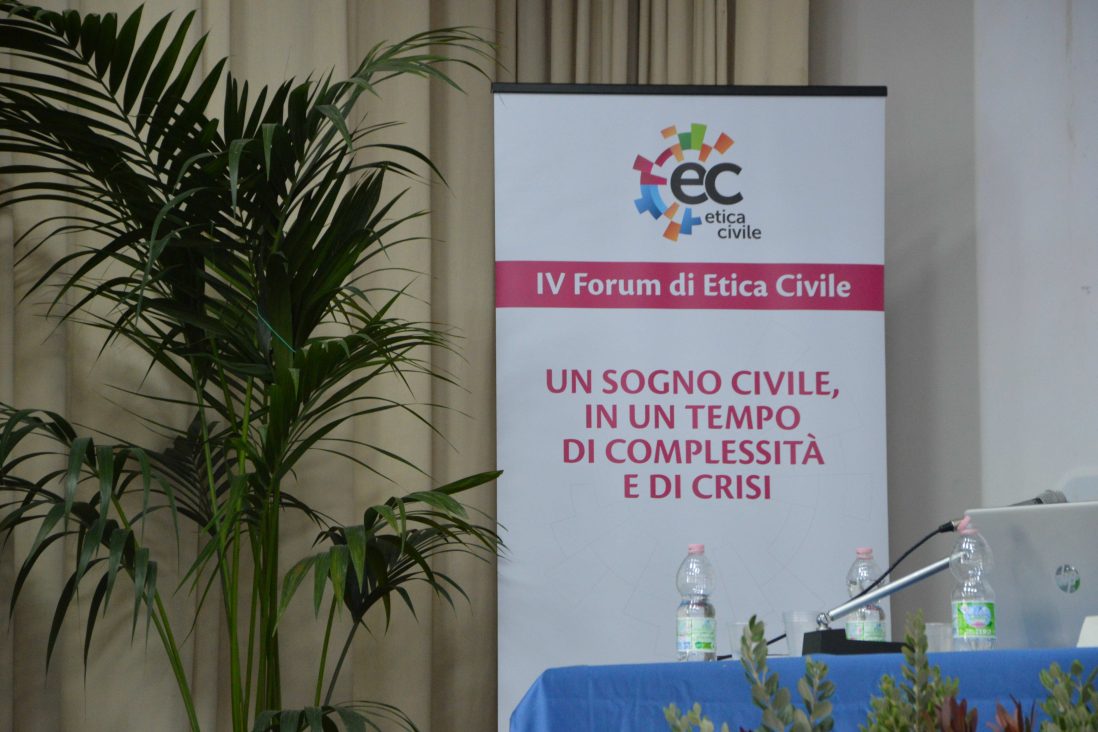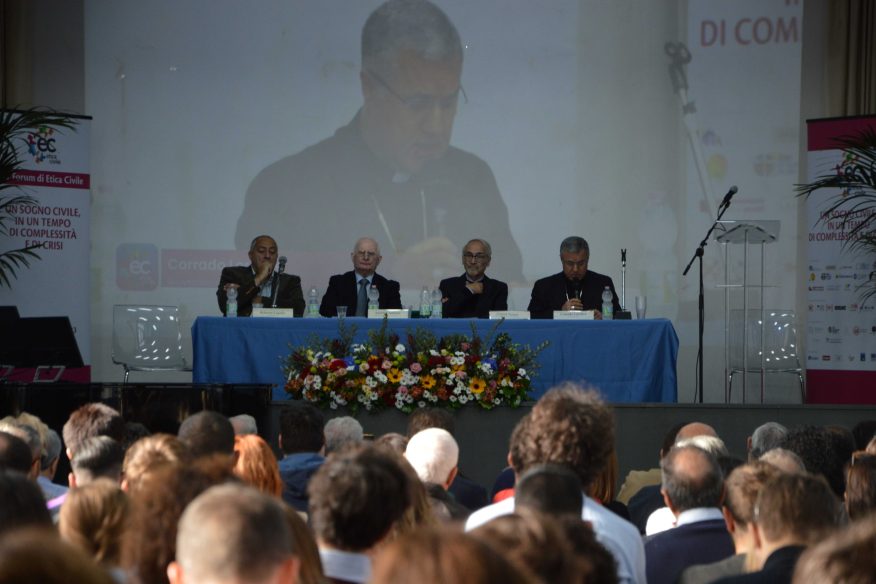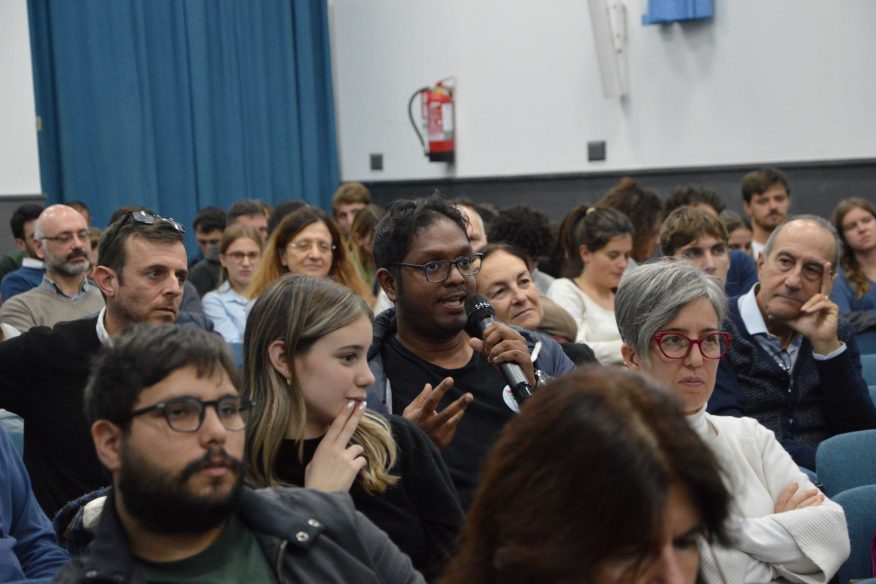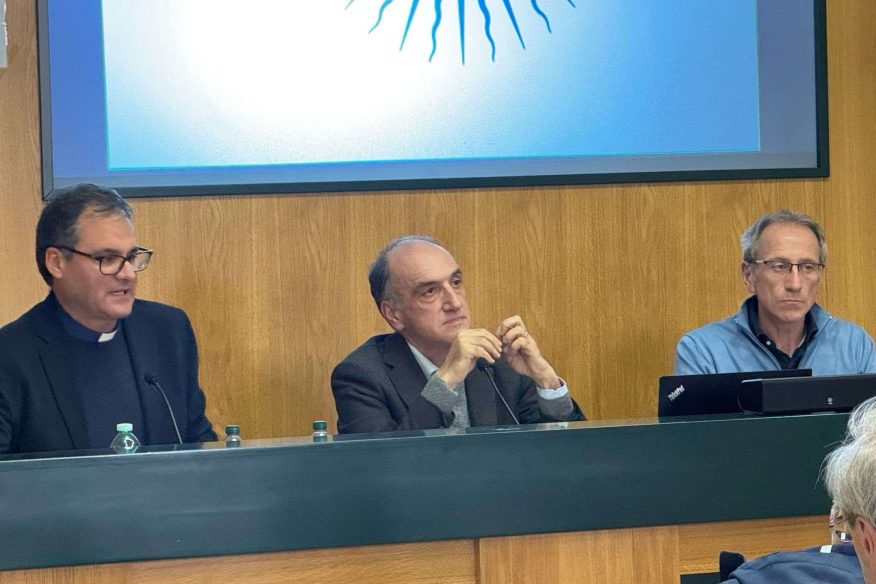Ethics Forum in Palermo: a pact, from below, for change

Making a concrete commitment to dream about cultural change from the grassroots, a generative society and a Mediterranean horizon. These are the three key points of the civil pact that emerged from the 4th Forum of Civil Ethics, held at the Jesuit Gonzaga Campus. The document emerged from the participation of 250 people and 16 associations gathered in four thematic tables on: Rethinking Politics, Mediterranean a Meeting Place of Cultures, Dialogue between Generations, and Peace on Earth and Peace Among Peoples.

Reinterpreting democracy
In the agreement, everyone’s commitment is to reinterpret the foundations of democracy in today’s context by overcoming the risks of autocracy; thus rethink the idea of politics so that it is authentically oriented toward caring for the other, the most fragile, the different; strengthen it with participatory processes to meet the challenges of the complex and technologically advanced societies in which we live; to bet on a politics made up of credible people who are open to confrontation and listening, prepared and courageous in their choices, so as to foster the involvement and participation of citizens; to promote an education for active citizenship, in a concrete collaboration between school, family and territory, also by enhancing the teaching of civic education and every tool available, to help teachers and students reflect and compare notes together; integrating, that is, the development of skills, with the formation of a knowledge and civic consciousness with a European scope. It will also be necessary to reread history from the perspective of other peoples, fostering opportunities for mutual knowledge and common cultural elaboration among the young people inhabiting the Mediterranean. Supporting civil society initiatives that raise awareness of environmental issues and the climate crisis, with the awareness that there are constitutional values (work and health first and foremost) that must be reconciled, and that in reference to these specific issues credibility is built in the field, through concrete and courageous actions. To promote processes of ethical education in personal care; to recall the commitment to a united Europe also on the Mediterranean horizon; to deepen the theme of digitization of democratic processes without emptying the sense of participation and responsibility; to create ethical spaces as a place of encounter and confrontation between different cultures by coming out of their own self-referential realities; to reactivate the institutes of popular participation; to train ourselves in a widespread leadership that recognizes the talents of each person and facilitates generative processes of good for all in communities; to raise awareness of disarmament policies.
Morandini: in cities, fully human
“Ten years have passed since the first Forum in 2013 and, now, we are well pleased to have come to Palermo,” said Simone Morandini, coordinator of the Civil Ethics Forum. “Within cities we have to become fully human. This is a challenge that is not trivial but needs to be carried forward to think about the rights of all. The Forum wants to be a mobilization of ethical content that is essential to enlighten our areas of life and to walk, more and more, toward horizons of meaning. The challenge today is to think of the city in a perspective of authentic habitability and hospitality. Our cities carry so many ambivalences and strong contradictions, interpreted along a spectrum, between good and evil, between conflicts and beauty. Is it possible, then, to keep dreaming? We must try if we are committed to a civil ethic. Let us try to grow an ‘us’ that moves away from the ‘I’ and the ‘you’. There are two ingredients today to propel us forward. The first is the courage to go against the current, feeling oneself to be part and part-taking in society. The second is the thought of hope that is linked to the ability to initiate the new.”
Young people’s word
The session dedicated to the experiences of young people was significant. Alessandro Galassi (documentarian and filmmaker) interviewed Allegra Tonnarini of FUCI, Marzio Chirico of Fridays For Future, Veronica Atitsogbe (Verona city councilwoman and founder of the Afroveronesii association) and Alessandro Chines of Politeia Palermo. “The plurality of people and realities, engaged at various levels, must fully coexist together with our time,” said Veronica Atitsogbe, african-veronese city councilwoman. “In addition to the political one, I think it is really important to create and enhance other social spaces because institutional space alone is no longer enough. Therefore, new spaces are needed to activate new forms of social participation. There is still, however, the difficulty of bringing out these new voices because the system is still closed. The challenge is to open up if we want to bring in a new way of doing politics. We have to build politics from the bottom up, having the courage to get out of our bubble, which is always made up of the same old faces. I was born within the context of town squares, and that is precisely why I believe in social activism, which gives inputs to address certain issues. After this first phase, we need to create other ways of interlocuting with politics. Mine was an experience that started as a challenge to speak to the new generations. I started from culture; in schools it is good to find awareness and responsibility among the younger ones. When I became a councillor, I remember there wasn’t even a youth policy office. We had to start from scratch. So much is yet to be done so that youth participation is not trivial and taken for granted. In my first year I listened to the neighbourhoods to figure out how to respond to needs. Currently, we are mapping social spaces.”
In the University
“In everything we do, the focus must be on the perspective that characterizes our engagement in both social activism and politics,” Allegra Tonnarini continued. “In the history of Fuci, for example, the choice has been not to isolate itself but to be inside the public university addressing the whole society. The challenge today is to recover the generosity of political thought. To do this, a vision must be proposed that succeeds in including as many realities as possible. There must be a common commitment that becomes an effort to think outside of oneself, from a social perspective for others. A lot of thought must be given to the scope of political and cultural quality.”
In the territory
“Ours began as a global movement that then also took root in the territory,” said Marzio Chirico. “The underlying commitment is to cross spaces, allowing ourselves to be contaminated and figure out how to act. We have always been trying to give a different vision and to put pressure on politics. We know that we cannot wait any longer if we want to help improve the world starting with the environment. One important tool is neighbourhood town assemblies and education in schools. The issue of ecological transaction must become a struggle on the ground that must impact the economic model. To achieve the goals we need, on the big issues, to overcome divisions and make concrete proposals.”
In the prison
“Listening and communicating is the basis of our engagement in schools, which we are also starting inside Pagliarelli Prison. We try to talk about politics and the right to vote, valuing the opinion of the person,” said Alessandro Chines. “The strong commitment is to create and grow a greater critical consciousness. Today, unfortunately, the real problem is also voting with blocked lists. The undemocratic consequence is that the political candidate will seek the people less and less, and the insides of the party ore and more for captatio benevolenzae. The only possible way is, however, to strive so that young people can have the awareness to change the system that today is based mainly on economic interests and not on the people.”
In Politics
The space on political reflection was given to Debora Spini, professor of political and social philosophy at New York University in Florence. “Politics is the art of living together among different people. Politics is a type of action that cannot be separated from responsibility. Today we find ourselves with what is a revival of the nation state. On the scene of international politics, we are seeing conflicts that seem to be a clear return to the past. We must, unfortunately, deal with a conservative international whose tentacles extend beyond individual political boundaries. The Conservative International combines many different elements. Related to this is the courage to pull out that ugly word that is capitalism, which has unhinged social geographies from the bottom up. The form of government we are witnessing is ‘democtatorship’ a hybrid reality between democracy and dictatorship. The challenges, then, are many and must all be deeply interconnected: there is the question of sustainability, justice and the transformations of capitalism. Left and right political distinctions appear less able to account for the emerging tensions. Despite everything, there is a great flowering and effervescence of social engagement and participation, which, however, since it can no longer find the channel to become a political project, is experienced as a form of anti-politics. What to do? Certainly, we must not lose the critical thinking that drives us to work together. For this, we need to put political work back at the centre as a vocation by also giving it back all its spiritual value. The bet is also to transform common vulnerability into a ground on which to build a solidarity dictated by the commitment of people capable of having empathy.”
Between Nations and Cultures
For the international session on “A Mediterranean Dialogue” for “The City and the Earth,” Grammenos Mastrojeni (deputy secretary-general Union for the Mediterranean) spoke and on “Peace, Between Faiths and Cultures,” Sihem Djebbi (professor of political science at the University of Paris XIII-Sorbonne) spoke. “Ethical action is that of those who today choose a better quality of life that is projected toward the good of others. There is a deep connection between the environment and justice. If you rebuild justice you can lay the foundation to have peace in the Mediterranean. The waters of the Mediterranean are warming alarmingly. 250 million people will be in water scarcity within 10 years. The state of affairs puts us at risk of losing control. How can we deal with this? There is not only the problem of the Mediterranean where we do not have climate migrants but human mobility moving for survival. We must try, however, to broaden the basket of solutions. The role of technology is not just latest pc but it is primarily a knowing-how-to-do-it together. We are finding that we need to pool together what we have. To do this we need to overcome all asymmetries. If we strive to create a sea of justice, we will eliminate a sea of conflict. Sustainability is calculating what you do beyond your own sector; the basic thinking is don’t do to others what you don’t want done to yourself. We have a very narrow window that is the opportunity to adopt a plan for the renewal of Italy that is offered to us with the NRRP. We have to start from this if we want to aim for a real sustainable conversion.”
In the Mediterranean
“We need to learn to think about our shared historical past in a better way,” Sihem Djebbi said. “Today, we have a very anxiogenic climate that has developed by only augmenting fear over the last 30 years. All this does not allow for critical thinking. We try to think about the world within a broad reflection on the Mediterranean. Often political narratives and discourses do not reflect the reality of the facts. We need to understand that we are faced with multiple and evolving identities of peoples and cultures. The problem is that everyone builds their own mental walls. There is a sovereigntist far right that takes away from the debate and the ability to understand problems critically and empirically today. No one talks about the concrete multiculturalism of some countries and the different transformations. The tendency is to make people read only the issues. The key reading is often not the real one but only the result of policies that instrumentalize reality. Uprisings must be explained in order to be understood in depth. The effort must be to look at harmony and peace, which are holistic dimensions. The media is not interested in bringing out dialogue – I am thinking of the Peace Caravan – but only the side of conflict, war and clash of civilizations. Let us remember that Jesus for Christians is love and God for Muslims is mercy. We must try to live in harmony as one united people.”
Serena Termini

The Coordination of the Civil Ethics Forum is composed of: Italian Catholic Action, Aggiornamenti Sociali, Bruno Longo Center, Giorgio La Pira International Student Center, Seeking an End, FOCSIV, Ethical Finance Foundation, Lanza Foundation, FUCI, Incontri, Pedro Arrupe Institute for Political Formation, Ecclesial Movement of Cultural Commitment, Eucharistic Youth Movement, Opera per la Gioventù Giorgio La Pira, Sapereambiente. Gonzaga Campus. Gonzaga Campus.
